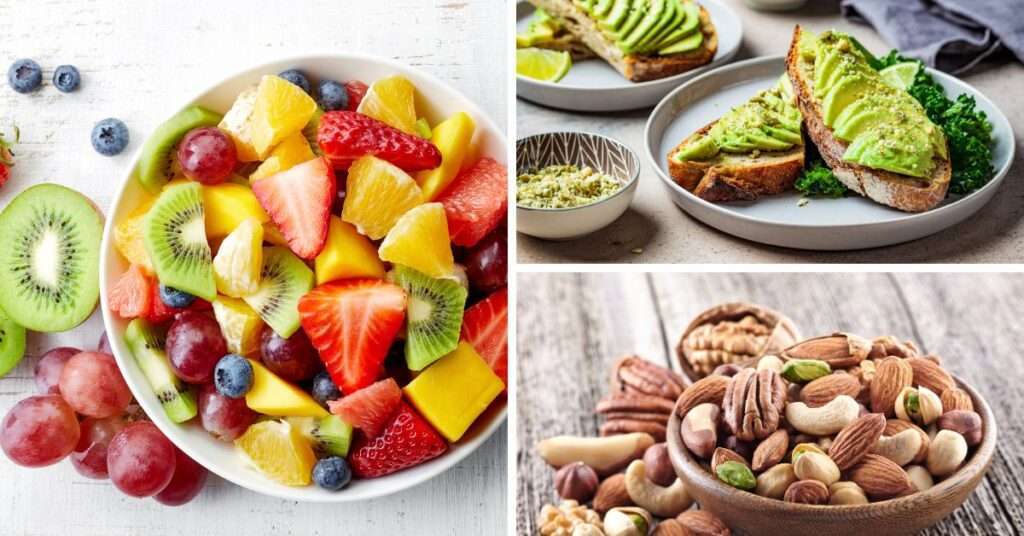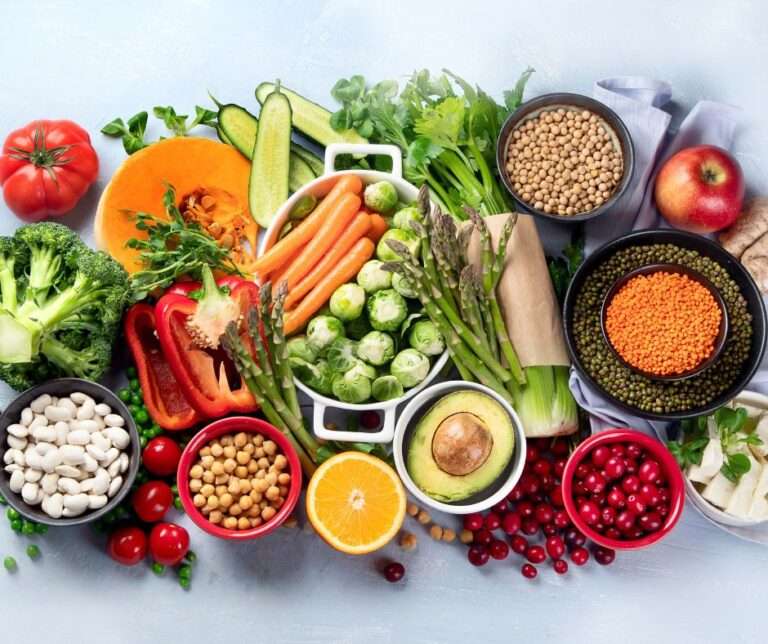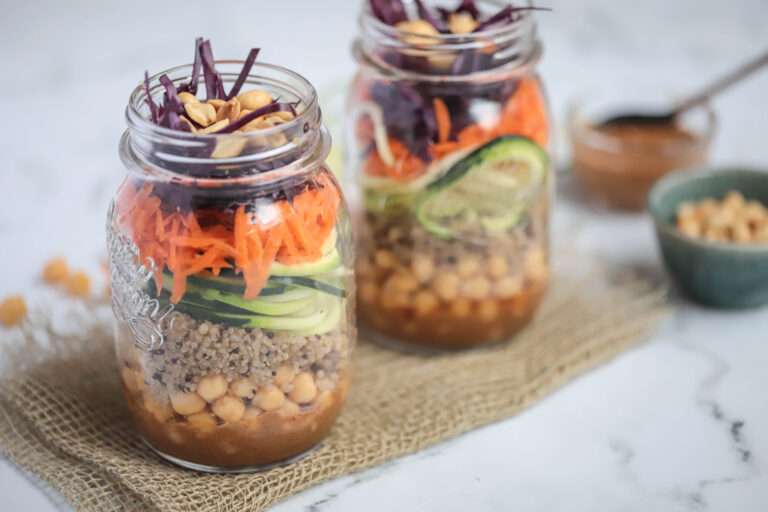Embarking on a weight loss journey often brings to mind a list of “forbidden” foods, conjuring up images of bland meals and unsatisfied cravings. However, the path to sustainable weight loss and overall health doesn’t have to be paved with restrictions. The process of uncovering which foods you shouldn’t cut out if you’re trying to lose weight illuminates why a balanced, non-restrictive approach to eating is not only more enjoyable but actually more effective for weight loss. Let’s debunk common myths and highlight foods you shouldn’t cut out if you’re trying to lose weight, ensuring these nutritious options maintain their rightful place in your diet, even—or especially—when you’re aiming to shed kilos.
Avocadoes: The Healthy Fat
Avocadoes, often maligned for their high fat content, are actually a boon for anyone looking to shed weight sustainably. The misunderstanding stems from outdated perceptions of dietary fat, but modern nutrition science offers a much more nuanced view. The fats in avocadoes are mostly monounsaturated fats, akin to those found in olive oil, known for their heart-healthy properties. These are prime examples of a food you shouldn’t cut out if you’re trying to lose weight.
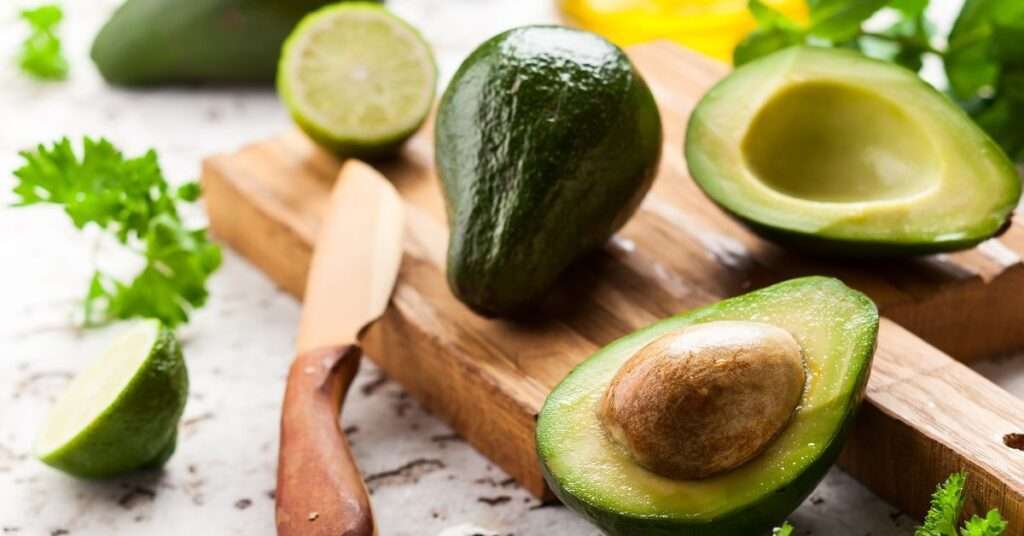
The Role of Monounsaturated Fats in Weight Loss
Monounsaturated fats are not just good for your heart; they also play a pivotal role in weight management, particularly in reducing unwanted belly fat. Research highlighted by the American Heart Association suggests that eating avocados, which are high in monounsaturated fats, at least once a week may lower the risk of developing heart disease. This is significant because it underscores the importance of plant-based unsaturated fats in improving diet quality and preventing cardiovascular disease, making avocadoes an excellent choice for those looking to manage their weight while supporting heart health.
Nutritional Powerhouse
Beyond their fat content, avocadoes are packed with fiber and essential nutrients, including potassium, vitamin E, and B vitamins. The fiber in avocadoes is particularly beneficial for weight loss, as it helps you feel full longer, reducing the likelihood of overeating. Moreover, the potassium content helps manage blood pressure, adding another layer to their heart-healthy benefits.
Incorporating Avocadoes into Your Diet
Incorporating avocadoes into your diet can be both easy and delicious. Their creamy texture and mild flavour make them a versatile ingredient in a variety of dishes. Here are some ideas:
- Smoothies: Adding avocado to smoothies can enhance their creaminess and nutritional profile. Combine with leafy greens, a piece of fruit, and a protein source for a balanced meal.
- Toast: Avocado toast has become a popular breakfast option for good reasons. The combination of whole grain bread and avocado provides a satisfying mix of fiber, healthy fats, and carbohydrates. Top with tomatoes, radishes, or seeds for extra flavour and nutrients.
- Salads: Dice avocado into salads to add creaminess and richness, reducing the need for high-calorie dressings. Their fat content can also help increase the absorption of fat-soluble vitamins found in other vegetables.
- Baking: Avocado can be used as a butter substitute in many baking recipes, reducing saturated fat content while maintaining moisture.
Check out these recipes:
- AVOCADO AND PEA SMASH: NOT YOUR AVERAGE AVO TOAST
- HOW TO MAKE AUTHENTIC MEXICAN GUACAMOLE IN 5 MINUTES!
A Note on Moderation
While avocadoes are undoubtedly healthy, they are also calorie-dense, so portion control is key. A serving size is generally considered to be about one-fifth of an avocado. Incorporating this serving size into your daily diet can help you reap the health benefits without exceeding your calorie needs.
By embracing avocadoes for their monounsaturated fats, fiber, and essential nutrients, you can enjoy a diet that supports weight loss and heart health without sacrificing taste or satisfaction.
Nuts and Seeds: Nutrient Powerhouses
Nuts and seeds stand out as nutritional giants, packed with proteins, healthy fats, and an array of vitamins and minerals. Their nutrient density supports various health benefits, not least of which includes aiding in weight management. Despite their rich calorie content, they are not linked to weight gain; rather, they might even bolster weight loss efforts. Truly, nuts and seeds are such foods you shouldn’t cut out if you’re trying to lose weight.
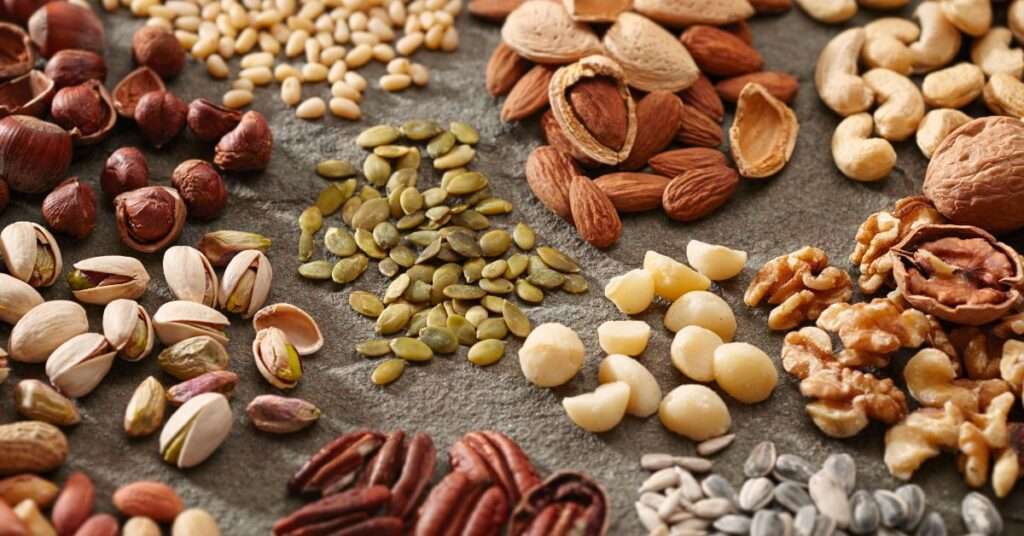
The Role of Nuts in Weight Management
Research consistently illustrates the beneficial impact of nuts on weight control. One comprehensive review published in the European Journal of Nutrition delves into this phenomenon. It suggests that regular consumption of nuts is not tied to weight gain and may even promote weight loss. This counterintuitive finding highlights the complex interaction between nuts, satiety, and metabolism.
Nuts and seeds contain a perfect blend of fiber, protein, and fat, which collectively contribute to feelings of fullness. This trio of nutrients slows down digestion, stabilizing blood sugar levels and reducing hunger pangs. As a result, you’re likely to consume fewer calories throughout the day, indirectly supporting weight loss efforts.
Scientific Evidence Supporting Nut Consumption
A study published in the BMJ Journal underscores the weight management properties of nuts. Participants who included nuts in their diet showed better weight management and lower risk of obesity over time. This aligns with the theory that nuts, despite their high energy content, can be a part of a diet aiming for weight loss or weight maintenance.
Moreover, nuts and seeds are not just about weight. They’re linked to a reduced risk of developing chronic diseases, including heart disease and type 2 diabetes. Their healthy fats, particularly omega-3 fatty acids found in walnuts and flaxseeds, are known for their anti-inflammatory properties and heart health benefits.
Practical Ways to Incorporate Nuts and Seeds into Your Diet
Incorporating nuts and seeds into your diet is remarkably easy and can also enhance the flavour and texture of your meals:
- Snacking: A small handful of almonds, walnuts, or pumpkin seeds can be a satisfying snack that keeps hunger at bay.
- Yogurts and Salads: Sprinkle chia seeds, flaxseeds, or crushed nuts over your yogurt or salad for a nutrient boost and added crunch.
- Baking and Cooking: Use ground nuts or seeds as a coating for tofu, or mix them into batter for baked goods for added protein and healthy fats.
A Note on Portion Control
While nuts and seeds are incredibly healthy, their calorie density means that portion control is crucial. A serving size typically looks like a small handful (approximately 1 ounce or 28 grams) per day. This quantity ensures that you can reap all the nutritional benefits of nuts and seeds without overindulging in calories.
Potatoes: Not All Carbs Are Created Equal
The humble potato, often dismissed in low-carb diets, is actually a nutritional powerhouse that deserves a spot in balanced eating plans. Emphasizing whole, unprocessed potatoes as foods you shouldn’t cut out if you’re trying to lose weight is vital because they are not only a good source of fiber but also rich in vitamins and minerals, including vitamin C, potassium, and vitamin B6.
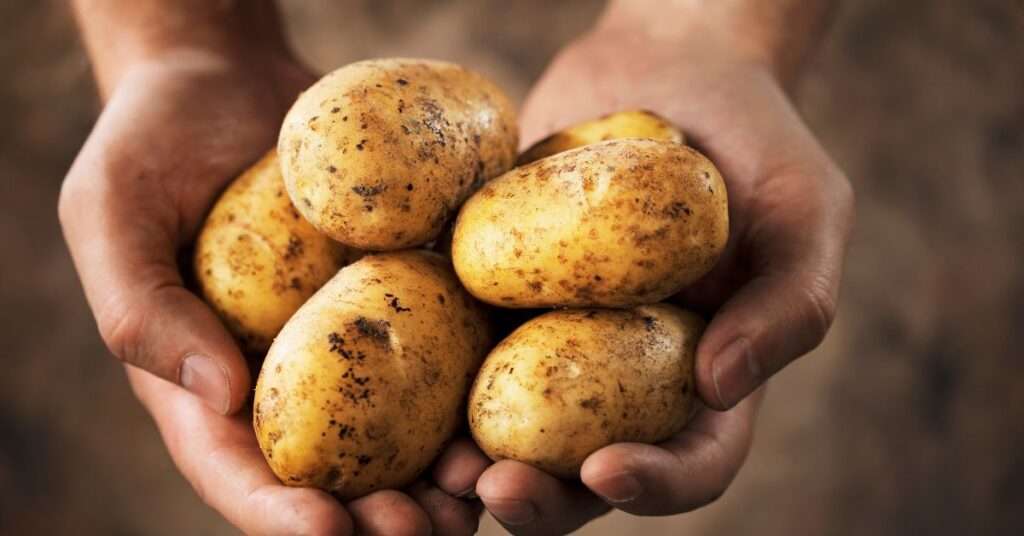
High Satiety Index
One of the most compelling reasons to include potatoes in your diet is their high satiety index. Research has shown that potatoes can make you feel fuller for longer periods compared to other carbohydrates. A study published in the European Journal of Clinical Nutrition evaluated various foods and their effects on satiety. Potatoes ranked highest, meaning they can help control hunger and reduce overall calorie intake, which is beneficial for weight management.
Nutritional Benefits
Potatoes are a good source of several micronutrients that are vital for health. They contain antioxidants like flavonoids, carotenoids, and phenolic acids which can help reduce the risk of chronic diseases such as heart disease and cancer. Moreover, the fiber in potatoes, especially when eaten with the skin on, is beneficial for digestive health.
Cooking Methods Matter
How you prepare potatoes can affect their nutritional value. Boiling, baking, or roasting potatoes with minimal added fat can preserve their health benefits and keep calorie content reasonable. Adding a drizzle of olive oil and your favorite herbs can enhance flavor without significantly increasing the calorie density of the dish.
Fruit: Nature’s Sweet Treat
Fruit, often misunderstood due to its natural sugar content, is in fact a mainstay of a nutritious diet. The fiber in fruit helps slow down the absorption of sugar, preventing sudden spikes in blood sugar levels. According to a breadth of research, fruit consumption is associated with reduced risk of many harmful conditions and is illustrative of why they’re a key food you shouldn’t cut out if you’re trying to lose weight.
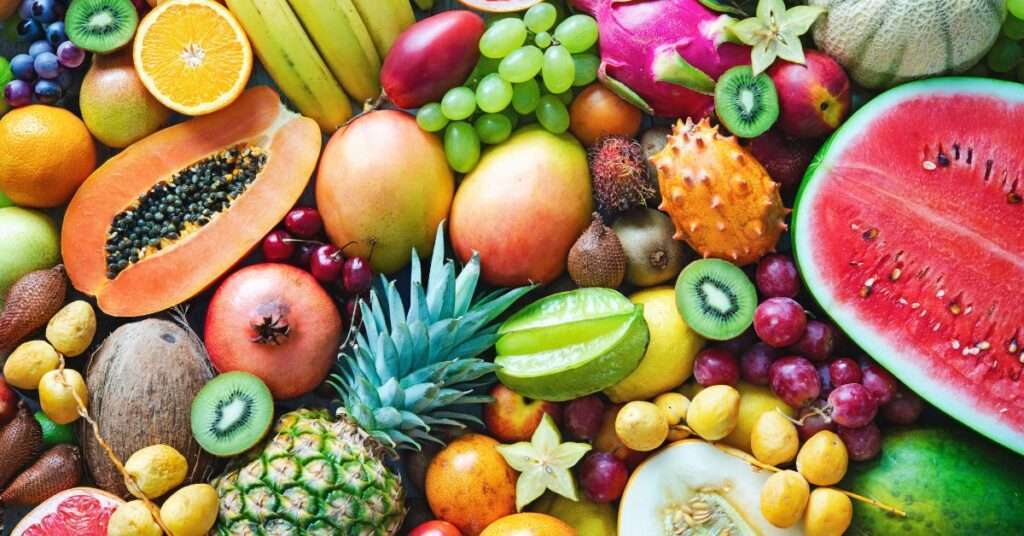
The Distinction Between Natural and Added Sugars
Natural sugars found in fruits come packaged with fiber, vitamins, and minerals, making them fundamentally different from added sugars. The fiber in fruit not only slows sugar absorption but also contributes to a feeling of fullness, reducing the likelihood of overeating.
The Impact of Fruit on Health and Weight Management
Extensive research underscores the positive impact of fruit consumption on health. A comprehensive review in Nutrition Reviews has linked fruit intake to a lower body weight and a diminished risk of obesity-related diseases. This association suggests that the inclusion of fruit in one’s diet can be a strategic component of weight management and overall health maintenance.
Recommendations for Fruit Consumption
Incorporating fruits into your diet can be both enjoyable and versatile:
- As Snacks: Fresh fruit makes an excellent snack, providing a sweet taste and nutritional benefits without the empty calories of many processed snack foods.
- In Smoothies: Adding fruit to smoothies can increase nutrient intake, making for a refreshing and healthful drink.
- As Desserts: Fruits can serve as a naturally sweet end to meals, satisfying sugar cravings with a healthier option.
Whole Grains: The Foundation of a Healthy Diet
Whole grains are an incredible source of different game-changing nutrients, reinforcing the point that they’re non-negotiable food you shouldn’t cut out if you’re trying to lose weight. They have essential dietary fiber, managing satiety and preventing uncontrolled snacking, all the while maintaining course for your cardiovascular, immunological, and various such systemic well-being.
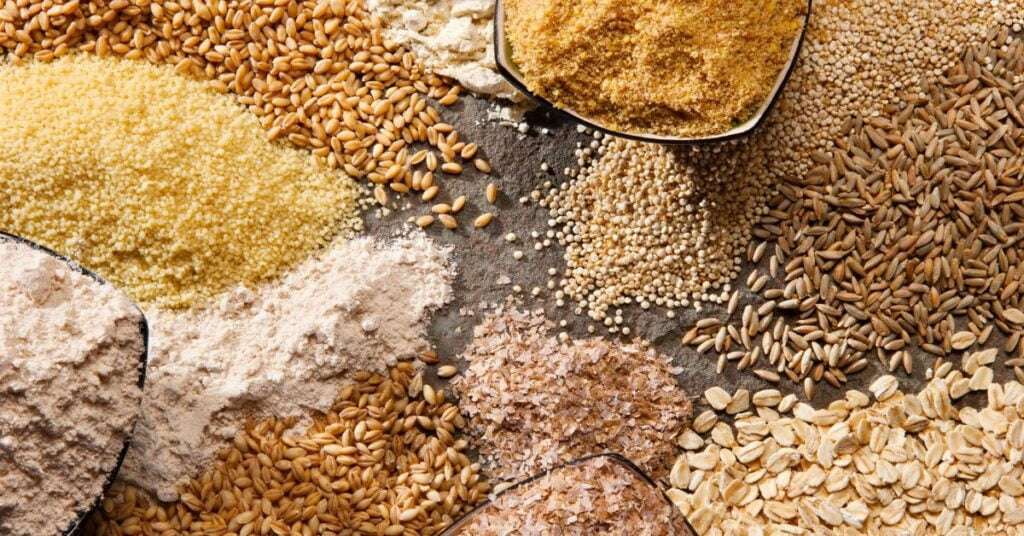
Essential Nutrients in Whole Grains
Whole grains are packed with nutrients that are vital for health. They provide:
- Dietary Fiber: Aids in digestion and can help improve cholesterol levels.
- Vitamins: Such as B vitamins, which are crucial for metabolism and energy production.
- Minerals: Including iron, magnesium, and selenium, which support immune function, bone health, and more.
Health Benefits of Whole Grains
Incorporating whole grains into your diet offers several health benefits beyond weight management, including:
- Reducing the Risk of Chronic Diseases: Regular consumption of whole grains has been linked to a lower risk of heart disease, type 2 diabetes, and certain forms of cancer.
- Supporting Digestive Health: The fiber in whole grains helps maintain bowel health and promotes regularity.
- Improving Cholesterol Levels: Whole grains can contribute to lower levels of bad cholesterol and higher levels of good cholesterol.
- Regulating Blood Sugar: The fiber in whole grains can slow the absorption of sugar, helping to control blood sugar levels.
Incorporating Whole Grains into Your Diet
Here are some practical tips for adding more whole grains to your meals:
- Choose Whole Over Refined: Opt for whole grain versions of your favorite bread, pasta, and rice to maximize nutritional benefits.
- Check Labels: Look for products that list a whole grain as the first ingredient to ensure you’re choosing a product rich in whole grains.
- Explore Variety: Try incorporating a range of whole grains, such as quinoa, farro, bulgur, and barley, to enjoy a variety of flavors and nutrients.
Check out these recipes:
Dessert: Indulgence in Moderation
Embracing desserts as part of a balanced, anti-diet, and non-restrictive approach to eating can enrich your diet without derailing your health goals. Moderation, along with choosing desserts that offer nutritional benefits, allows you to indulge wisely while still enjoying the sweeter things in life.
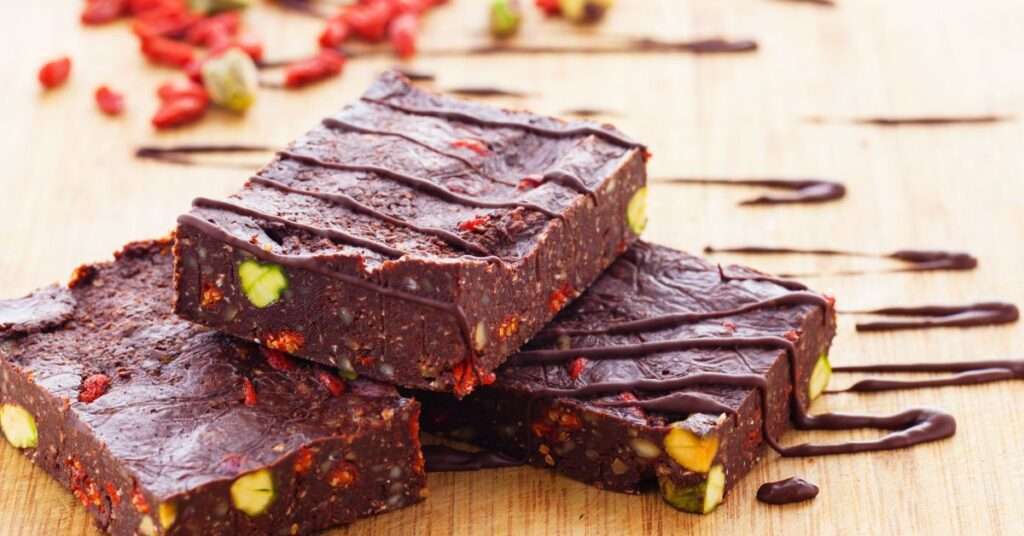
Rethinking Dessert Choices
Opting for desserts that incorporate wholesome ingredients can transform your treat into a nutrient-rich addition to your diet. Here are some ideas:
- Dark Chocolate: Rich in antioxidants, dark chocolate (preferably with a high cocoa content) can satisfy cravings for something decadent. The flavonoids in dark chocolate have been linked to heart health benefits, such as improving blood flow and lowering blood pressure.
- Baked Fruits: Baking fruits, like apples or pears, with spices such as cinnamon, can enhance their natural sweetness. This method creates a delicious dessert that doesn’t require added sugars. Baked fruits can be a great source of vitamins, fiber, and antioxidants.
- Homemade Fruit Popsicles: By blending your favorite fruits and freezing them, you can create homemade popsicles. This is a refreshing way to enjoy the natural sweetness of fruit, plus you can add herbs or a squeeze of lemon for an extra flavor twist. These popsicles are hydrating and free from the artificial colors and sweeteners often found in store-bought versions.
- Yogurt Parfaits: Layering Greek dairy free yogurt with fruits and a sprinkle of nuts or granola can make a satisfying dessert that doubles as a protein and probiotic boost. The yogurt provides calcium and probiotics for digestive health, while the fruits add fiber and vitamins.
The Role of Moderation
Moderation is key in enjoying desserts as part of a healthy diet. It’s about balancing the desire for sweetness with the nutritional quality of what you’re eating. Listening to your body’s cues and enjoying desserts mindfully can prevent overindulgence and help maintain a healthy relationship with food.
Embracing Mindfulness and Variety
Being mindful about your dessert choices involves acknowledging your cravings and allowing yourself to indulge in a way that feels satisfying and balanced. It’s also about variety—incorporating different types of desserts can keep your diet interesting and ensure you’re getting a range of nutrients.
Incorporating a variety of wholesome foods into your diet is a key step toward achieving your weight loss and health goals. But understanding how to do this in a way that fits your individual needs, preferences, and lifestyle can be challenging. This is where personalized meal planning services come into play, offering a tailored approach to healthy eating.
Why Consider a Personalized Meal Planning Service?
Customization to Your Dietary Needs: A personalized meal planning service takes into account your specific dietary requirements, whether you’re focusing on weight loss, managing a health condition, or simply striving for a balanced diet. This means you’ll receive meal plans that are not only nutritious but also cater to your unique needs.
Saves Time and Reduces Stress: Figuring out what to eat every day can be time-consuming and sometimes overwhelming. A meal planning service removes this burden by providing you with a structured plan, complete with recipes and grocery lists, allowing you to enjoy delicious meals without the hassle.
Educational Benefits: Along with providing meal plans, many services offer insights into nutrition and healthy eating habits. This educational aspect empowers you to make informed choices about your diet in the long run.
Supports Sustainable Weight Loss: By focusing on nourishing your body with the right foods, a meal planning service can help you achieve sustainable weight loss. This approach encourages a balanced diet filled with a variety of nutrients, avoiding the pitfalls of restrictive dieting that often leads to yo-yo weight loss and gain.

How Our Meal Planning Service Can Help
Our meal planning service, designed with your health and wellness in mind, offers a comprehensive solution to eating well and achieving your weight loss goals. Here’s how we can support you:
- Tailored Meal Plans: Based on your dietary preferences, health goals, and lifestyle, we craft meal plans that are both satisfying and nutritionally balanced.
- Easy-to-Follow Recipes: Enjoy a range of delicious, nutritionist-designed recipes that are simple to prepare, ensuring you look forward to every meal without feeling overwhelmed.
- Grocery Lists: To save you time and streamline your meal preparation process, we provide detailed grocery lists that make shopping a breeze.
- Nutritional Support: Our team is here to offer guidance and answer any questions you have about your meal plans, helping you stay on track toward your goals.
Conclusion
Weight loss and healthy eating are not about eliminating entire food groups or depriving yourself of the foods you love. Embracing a balanced approach, which includes a variety of nutrient-dense foods, allows for sustainable and enjoyable weight loss. It’s important to focus on building a healthier, happier lifestyle that is maintainable in the long run. Indulging in a wide range of nutritious foods like avocados, nuts, potatoes, fruits, whole grains, and even desserts in moderation can enrich your diet, ensuring you’re not just working towards weight loss but also nourishing your body with all the essential nutrients it needs.
Our personalized meal planning service is designed to support this balanced, non-restrictive approach to eating. By providing you with tailored meal plans that cater to your unique needs and preferences, we aim to make healthy eating effortless and enjoyable. You’ll receive delicious, chef-designed recipes and detailed grocery lists to simplify your meal preparation, allowing you to focus on nourishing your body and enjoying your meals without the stress of planning and decision-making.
Take the Next Step Towards a Healthier You
Are you ready to transform your approach to weight loss and healthy eating? Visit our website today to learn more about our meal planning services and discover how we can help you achieve your health and weight loss goals with ease. Sign up to start enjoying personalized, nutritious meals that will support you in building a healthier, happier lifestyle you can maintain over the long term. Join us now on your journey to wellness, and let’s celebrate the joy of eating well together. Your body (and your taste buds) will thank you.

